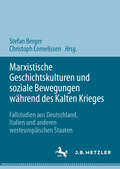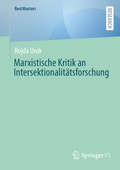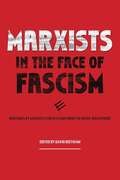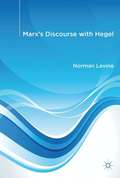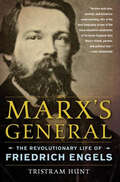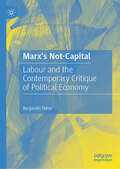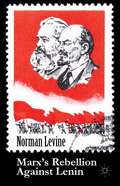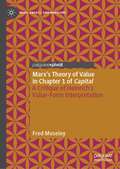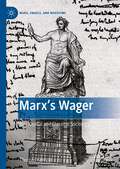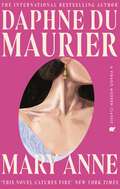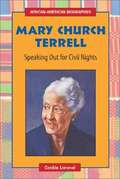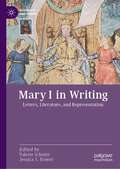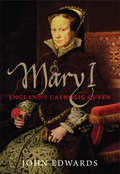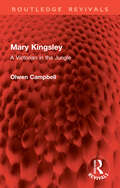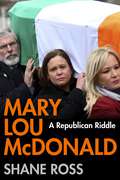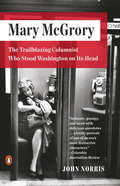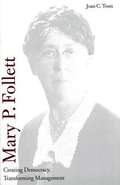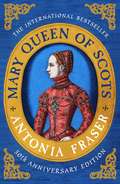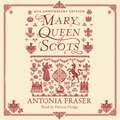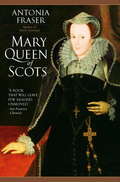- Table View
- List View
Marxistische Geschichtskulturen und soziale Bewegungen während des Kalten Krieges: Fallstudien aus Deutschland, Italien und anderen westeuropäischen Staaten
by Stefan Berger Christoph CornelissenIn diesem Buch wird die Beziehung zwischen verschiedenen sozialen Bewegungen und marxistischen Geschichtskulturen in der zweiten Hälfte des 20. Jahrhunderts in Westeuropa untersucht, wobei der Schwerpunkt auf der Bundesrepublik Deutschland und Italien liegt. Während des Kalten Krieges prägten marxistische Ideen und Geschichtsauffassungen nicht nur die traditionellen kommunistischen Parteien in Westeuropa, sondern beeinflussten auch eine Reihe neuer sozialer Bewegungen, die in den 1970er Jahren im Gefolge der Studentenrevolte von 1968 aufkamen. Die 68er-Generation war stark von neomarxistischen Ideen geprägt, die sie später in die neuen sozialen Bewegungen trug. Der Band geht der Frage nach, wie marxistische Geschichtskulturen die Bewegungen der Dritten Welt, die antifaschistischen Bewegungen, die Friedensbewegung und eine ganze Reihe anderer neuer sozialer Bewegungen beeinflusst haben, die ab den 1970er Jahren eine neue Lebendigkeit der Zivilgesellschaft in Westeuropa signalisierten.
Marxistische Kritik an Intersektionalitätsforschung (BestMasters)
by Rojda UrukWährend Anfang des 20. Jahrhunderts gesellschaftliche Ungleichheitsstrukturen vor allem durch marxistische Ansätze erklärt wurden und damit ein Objektivitätsanspruch einherging, bestimmen heute vor allem individualisierte Mikroanalysen die sozialwissenschaftliche Perspektive, die Ungleichheiten zwischen Individuen suchen und einen Subjektivitätsanspruch zentrieren. Marxismus und Intersektionalität scheinen manchen aktuell unvereinbar. Demgegenüber wird in diesem Buch gezeigt, dass die Intersektionalitätsforschung erst in Abgrenzung zum Marxismus entstehen konnte und sich daher die Differenzierungslinien beider in Theorie, Methodologie und Methode der Intersektionalität bis heute wiederfinden lassen. Deutlich wird, dass der Marxismus sich zwar mit der Intersektionalität (erneut) mit idealistischen Erklärungsversuchen gesellschaftlicher (Nicht-)Zusammenhänge konfrontiert sieht, seine Aktualität als Kritik aller Ungleicheitsverhältnisse aber nicht eingebüßt hat.
Marxists in the Face of Fascism: Writings by Marxists on Fascism From the Inter-war Period
by David BeethamFascism’s ascent to power across Europe in the 1920s and 1930s marks one of the greatest historical defeats of the left in all of history. Yet, this catastrophic de- feat was resisted at every turn by Marxists who tried, unsuccessfully, to push the mass communist and social democratic parties to organize an opposition to the rising movements of violent reaction. Their devastating failure paved the way for the gas chamber, decades of ruthless dictatorship, and war. This important volume offers the most complete selection of Marxist writings on fascism from this period in any language and provides invaluable lessons for contemporary readers concerned with today’s far-right.
Marx’s Discourse with Hegel
by Norman LevineThe end of Stalinist Russia, China's change under Deng Xiaoping and the publication of previously unexplored documents of Marx in the MEGA2 opened a new epoch in the analysis of Marx. Marx's Discourse With Hegel is both a product and contribution to this rebirth of Marxism by its reformulation of the relationship between Hegel and Marx
Marx’s General: The Revolutionary Life of Friedrich Engels
by Tristram HuntFriedrich Engels is one of the most intriguing and contradictory figures of the nineteenth century. Born to a prosperous mercantile family, he spent his life enjoying the comfortable existence of a Victorian gentleman; yet he was at the same time the co-author of The Communist Manifesto, a ruthless political tactician, and the man who sacrificed his best years so that Karl Marx could have the freedom to write. Although his contributions are frequently overlooked, Engels's grasp of global capital provided an indispensable foundation for communist doctrine, and his account of the Industrial Revolution, The Condition of the Working Class in England, remains one of the most haunting and brutal indictments of capitalism's human cost. <p><p>Drawing on a wealth of letters and archives, acclaimed historian Tristram Hunt plumbs Engels's intellectual legacy and shows us how one of the great bon viveurs of Victorian Britain reconciled his exuberant personal life with his radical political philosophy. This epic story of devoted friendship, class compromise, ideological struggle, and family betrayal at last brings Engels out from the shadow of his famous friend and collaborator.
Marx’s Not-Capital: Labour and the Contemporary Critique of Political Economy
by Benjamin TetlerAs a contribution to critical social theory, this book reconsiders Marx’s critique of political economy through the concept of labour as “not-capital”. Engaging with thinkers who have dealt with Marx’s concepts of “not-capital” and “not-value”, Tetler examines whether and how these concepts can contribute significantly towards a renewal of the critique of political economy beyond the limits of traditional Marxism. In doing so he provides the first in depth interrogation of these concepts, both within Marx’s work itself and within and across the various intellectuals who have put them to use in their attempts to address the faults of traditional Marxism. He argues that the theory of value that sits at the heart of Marx’s critique of political economy requires a negative conception of labour. In helping establish this, the notions of labour as not-capital/value are shown to have formidable ramifications concerning the crisis-ridden nature of capitalist social relations and the struggles operative within and against them.
Marx’s Rebellion Against Lenin
by Norman LevineMarx's Rebellion Against Lenin, by negating the Leninist-Stalinist theory of dialectical materialism and tracing Marx's political philosophy to the Classical Humanism of Aristotle, overthrows the stultifying entrapment of Stalinist Bolshevism and contributes to the revitalization of Marx's method.
Marx’s Theory of Value in Chapter 1 of Capital: A Critique of Heinrich’s Value-Form Interpretation (Marx, Engels, and Marxisms)
by Fred MoseleyChapter 1 is the most important chapter in Capital, as well as the most difficult and the most controversial. An influential interpretation of Chapter 1 in recent decades has been the so-called “value-form interpretation” of Marx’s theory in general and Chapter 1 in particular. The most important proponent of the value-form interpretation today, both in Germany and in the English-speaking world, is Michael Heinrich, and Heinrich’s work has emphasized the first chapter. Heinrich’s latest book in English is a detailed commentary of the first seven chapters of Volume 1 of Capital. The publication of an English translation of Heinrich’s book is an important event in Marxian scholarship and it is important to critically engage with this important book in order to advance our understanding of this critical foundational chapter. This book emphasizes the quantitative issue of whether the magnitude of value and socially necessary labour-time are determined in production or also depend on exchange and demand, which has been the main issue in the controversy over the value-form interpretation.
Marx’s Wager: Das Kapital and Classical Sociology (Marx, Engels, and Marxisms)
by Thomas KempleMarx's masterpiece Capital (Das Kapital) ignored or misread as well as selectively and creatively interpreted by the generation of social scientists that came after him. Emile Durkheim, Max Weber, and Georg Simmel attempt to supplement what they call ‘historical materialism’ or to engage in debates about ‘socialism’ through their readings of The Communist Manifesto and occasional Capital. Although these and other classical sociologists did not have access to most of Marx’s published and unpublished works as we do today, each is concerned with revising and refining Marx’s unfinished critique of political economy. Despite their differences with Marx and with one another, they share his concern with how empirically detailed and scientifically valid knowledge of the social world may inform historical struggles for a more human world. This commitment can be called ‘Faustian’, after the title character of the poet J. W. von Goethe’s tragic epic of modernity, insofar as Marx and the classical sociologists hope to translate theory into practice while making a pact or wager with the diabolical social, political, and economic forces of the modern world.
Mary Anne (Virago Modern Classics #118)
by Daphne Du Maurier'She wrote exciting plots, she was highly skilled at arousing suspense' GUARDIAN 'This novel catches fire' NEW YORK TIMES 'With unfailing du Maurier skill, the author has coupled family interest with dramatic sense' ELIZABETH BOWENShe set men's hearts on fire and scandalized a country. In Regency London, the only way for a woman to succeed is to beat men at their own game. So when Mary Anne Clarke seeks an escape from her squalid surroundings in Bowling Inn Alley, she ventures first into the scurrilous world of the pamphleteers. Her personal charms are such, however, before long she is noticed by the Duke of York.With her taste for luxury and power, Mary Anne, now a royal mistress, must aim higher. Her lofty connections allow her to establish a thriving trade in military commissions, provoking a scandal that rocks the government and brings personal disgrace.A vivid portrait of overweening ambition, Mary Anne is set during the Napoleonic Wars and based on the life of du Maurier's own great-great-grandmother.
Mary Anne (Vmc Ser. #519)
by Daphne du MaurierA vivid portrait of overweening ambition set during the Napoleonic Wars and based on du Maurier's own great-great-grandmother.
Mary Church Terrell: Speaking Out for Civil Rights
by Cookie LommelThroughout her long life, Mary Church Terrell never let any obstacle block her path. At age 86, she led a successful battle to integrate the restaurants of Washington, D.C. This was one more link in a lifelong chain of fights and firsts for this outspoken African-American woman. Terrell was one of the first black women in the United States to earn a college degree, the first to be appointed to a school board, the first president of the National Association of Colored Women (NACW), and a founder of the NAACP. In a narrative brimming with true stories, author Cookie Lommel introduces readers to the extraordinary activist who helped set a new course for blacks and women in the United States.
Mary I
by Sarah DuncanThis book explores the gender politics of the reign of Mary I of England from her coronation to her funeral and examines the ways in which the queen and her supporters used language, royal ceremonies, and images to bolster her right to rule and define her image as queen.
Mary I in Writing: Letters, Literature, and Representation (Queenship and Power)
by Valerie Schutte Jessica S. HowerThis book—along with its companion volume Writing Mary I: History, Historiography, and Fiction—centers on representations of Queen Mary I in writing, broadly construed, and the process of writing that queen into literature and other textual sources. It spans an equally wide chronological and geographical scope, accounting for the years prior to her accession in July 1553 through the centuries that followed her death in November 1558 and for her reach across England, and into Ireland, Spain, Italy, Russia, and Africa. Its intent is to foreground words and language—written, spoken, and acted out—and, by extension, to draw out matters of and conversations about rhetoric, imagery, methodology, source base, genre, narrative, form, and more. Taken together, these two volumes find in England’s first crowned queen regnant an incomparable opportunity to ask new questions and seek new answers that deepen our understanding of queenship, the early modern era, and modern popular culture.
Mary I: England's Catholic Queen
by John EdwardsThe lifestory of Mary I--daughter of Henry VIII and his Spanish wife, Catherine of Aragon--is often distilled to a few dramatic episodes: her victory over the attempted coup by Lady Jane Grey, the imprisonment of her half-sister Elizabeth, the bloody burning of Protestants, her short marriage to Philip of Spain. This original and deeply researched biography paints a far more detailed portrait of Mary and offers a fresh understanding of her religious faith and policies as well as her historical significance in England and beyond. John Edwards, a leading scholar of English and Spanish history, is the first to make full use of Continental archives in this context, especially Spanish ones, to demonstrate how Mary's culture, Catholic faith, and politics were thoroughly Spanish. Edwards begins with Mary's origins, follows her as she battles her increasingly erratic father, and focuses particular attention on her notorious religious policies, some of which went horribly wrong from her point of view. The book concludes with a consideration of Mary's five-year reign and the frustrations that plagued her final years. Childless, ill, deserted by her husband, Mary died in the full knowledge that her Protestant half-sister Elizabeth would undo her religious work and, without acknowledging her sister, would reap the benefits of Mary's achievements in government.
Mary I: The Daughter of Time (Penguin Monarchs)
by John EdwardsThe elder daughter of Henry VIII, Mary I (1553-58) became England's ruler on the unexpected death of her brother Edward VI. Her short reign is one of the great potential turning points in the country's history. As a convinced Catholic and the wife of Philip II, king of Spain and the most powerful of all European monarchs, Mary could have completely changed her country's orbit, making it a province of the Habsburg Empire and obedient again to Rome. These extraordinary possibilities are fully dramatized in John Edward's superb short biography. The real Mary I has almost disappeared under the great mass of Protestant propaganda that buried her reputation during her younger sister, Elizabeth I's reign. But what if she had succeeded?
Mary Kingsley: A Victorian in the Jungle (Routledge Revivals)
by Olwen CampbellThe name of Mary Kingsley deserves to be more widely known than it is today. A woman of rare abilities and boundless courage, living in an age when the narrowest Victorian conventions about the duties of daughters in the home still prevailed, she nevertheless achieved fame and distinction as a traveller in the wildest regions of West Africa, a writer, an ethnologist, and an expert on Colonial Government.As a young woman, Mary Kingsley had no life beyond the strict confines of her home; not until 1892, when she was thirty, did freedom come to her. Instantly this astonishing young woman began the work, which was to lead her to remote, unexplored regions of ‘the Coast’. Along unmapped rivers, to a study of cannibals, and in England, to a political struggle to which she wholeheartedly gave herself for the welfare of the peoples of West Africa, until her death in 1900.In vivid, discursive travel books, Mary Kingsley described her experiences with immense detachment and humour. These lengthy works have long been out of print, but in Mary Kingsley: A Victorian in the Jungle (first published in 1957.) Olwen Campbell, by presenting selected extracts, preserves in a concise form the record of these strange adventures. But the adventures themselves are only a part of a remarkable life story. The effects on Mary Kingsley’s character of her oppressive home life are fully brought out for the first time, and some explanation is suggested of a most enigmatic personality. Fresh light is also thrown on her political work, and her character, by a number of extracts from a series of remarkable letters, never before published.
Mary Lou McDonald: A Republican Riddle
by Shane RossA biography of the Sinn Fé in leader, and Taoiseach in waiting, Mary Lou McDonald.Mary Lou McDonald is the bookies' favourite to be Ireland's next Taoiseach. She would be the first woman to reach the office, and the first Sinn Fé in leader ever to enter government in the Republic of Ireland. But how did a quintessentially bourgeois woman end up as the leader of a political party with such a recent terrorist past? And was her change of allegiance from Fianna Fá il to Sinn Fé in ideological or opportunistic?Shane Ross's scrupulously fair and balanced biography illuminates McDonald's political awakening, her relationship with the hard men of the IRA, and the evolution and future of Sinn Fé in.
Mary McGrory
by John NorrisA wildly entertaining biography of the trailblazing Washington columnist and the first woman to win the Pulitzer Prize for commentary Before there was Maureen Dowd or Gail Collins or Molly Ivins, there was Mary McGrory. She was a trailblazing columnist who achieved national syndication and reported from the front lines of American politics for five decades. From her first assignment reporting on the Army-McCarthy hearings to her Pulitzer-winning coverage of Watergate and controversial observations of President Bush after September 11, McGrory humanized the players on the great national stage while establishing herself as a uniquely influential voice. Behind the scenes she flirted, drank, cajoled, and jousted with the most important figures in American life, breaking all the rules in the journalism textbook. Her writing was admired and feared by such notables as Lyndon Johnson (who also tried to seduce her) and her friend Bobby Kennedy who observed, "Mary is so gentle--until she gets behind a typewriter." Her soirees, filled with Supreme Court justices, senators, interns, and copy boys alike, were legendary. As the red-hot center of the Beltway in a time when the newsrooms were dominated by men, McGrory makes for a powerfully engrossing subject. Laced with juicy gossip and McGrory's own acerbic wit, John Norris's colorful biography reads like an insider's view of latter-day American history--and one of its most enduring characters.
Mary P. Follett: Creating Democracy, Transforming Management
by Joan C. TonnMary P. Follett (1868-1933) brought new dimensions to the theory and practice of management and was one of America's preeminent thinkers about democracy and social organization. The ideas Follett developed in the early twentieth century continue even today to challenge thinking about business and civic concerns. This book, the first biography of Follett, illuminates the life of this intriguing woman and reveals how she devised her farsighted theories about the organization of human relations. --BOOK JACKET. Title Summary field provided by Blackwell North America, Inc. All Rights Reserved
Mary Queen Of Scots
by Antonia Fraser'Ground-breaking ... One of the greatest international bestsellers of the post-war period' Andrew Roberts, Daily Telegraph'Reads like an engrossing novel' Sunday TimesAn infant queen. A teenage widow. Beautiful, flamboyant Mary Queen of Scots had a formidable intellect but her political sense - formed at the absolute court of France - plunged her country into a maelstrom of intrigue, marriage and murder. Upon fleeing to England she was held captive by her cousin Elizabeth I. In this classic biography, reissued for the fiftieth anniversary of its publication, acclaimed historian Antonia Fraser relates the enthralling story of Mary's life and untimely end.
Mary Queen Of Scots
by Lady Antonia FraserMary Queen of Scots passed her childhood in France and married the Dauphin to become Queen of France at the age of sixteen. Widowed less than two years later, she returned to Scotland as Queen after an absence of thirteen years.Her life then entered its best known phase: the early struggles with John Knox, and the unruly Scottish nobility; the fatal marriage to Darnley and his mysterious death; her marriage to Bothwell, the chief suspect, that led directly to her long English captivity at the hands of Queen Elizabeth; the poignant and extraordinary story of her long imprisonment that ended with the labyrinthine Babington plot to free her, and her execution at the age of forty-four.Read by Patricia Hodge(p) 2002 Orion Publishing Group
Mary Queen of Scots
by Antonia FraserShe was the quintessential queen: statuesque, regal, dazzlingly beautiful. Her royal birth gave her claim to the thrones of two nations; her marriage to the young French dauphin promised to place a third glorious crown on her noble head.<P> Instead, Mary Stuart became the victim of her own impulsive heart, scandalizing her world with a foolish passion that would lead to abduction, rape and even murder. Betrayed by those she most trusted, she would be lured into a deadly game of power, only to lose to her envious and unforgiving cousin, Elizabeth I. Here is her story, a queen who lost a throne for love, a monarch pampered and adored even as she was led to her beheading, the unforgettable woman who became a legend for all time.
Mary Queen of Scots
by Antonia FraserMary Queen of Scots passed her childhood in France and married the Dauphin to become Queen of France at the age of sixteen. Widowed less than two years later, she returned to Scotland as Queen after an absence of thirteen years.
